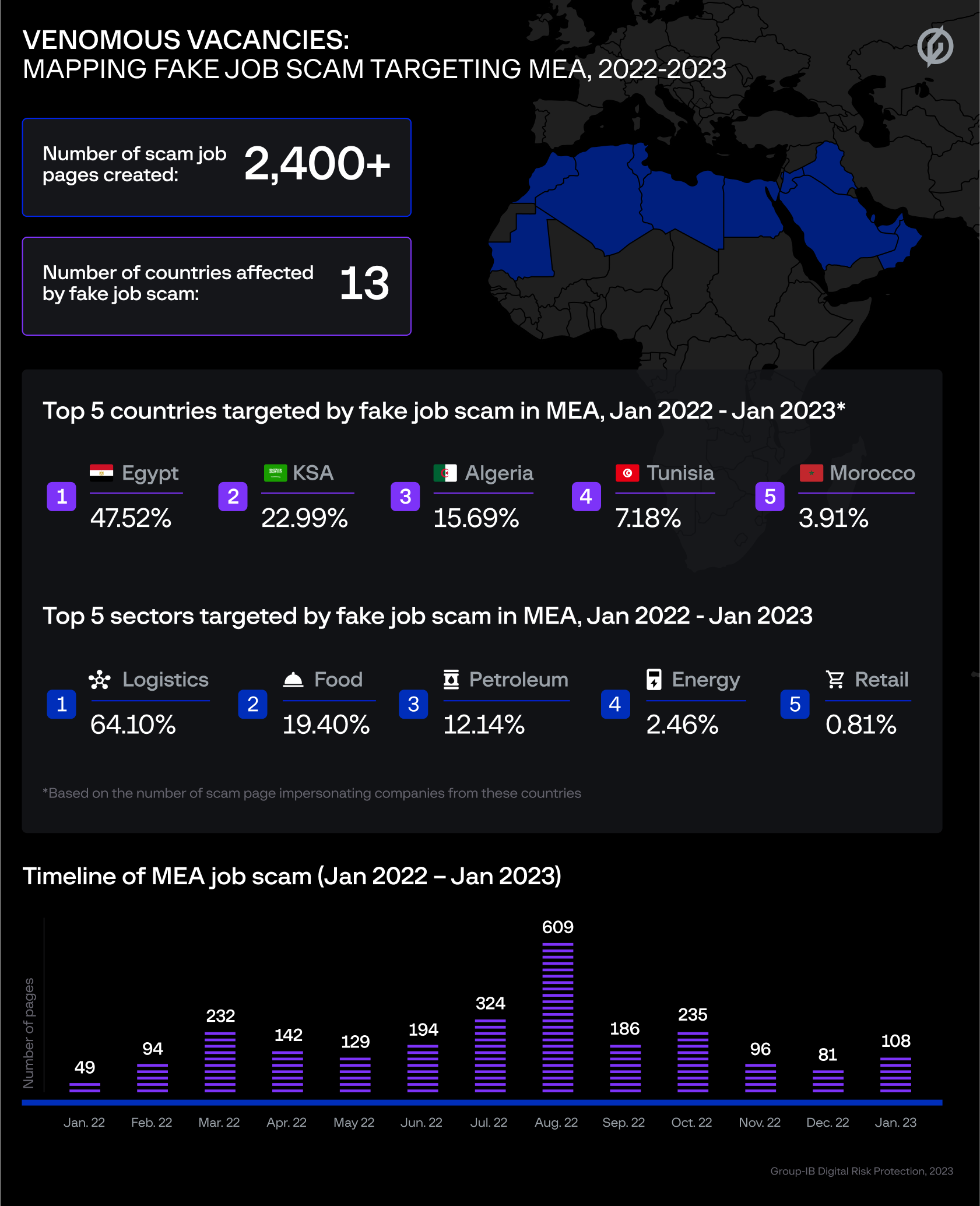News
Cybersecurity Firm Uncovers 2,400+ Fake Arabic Job Pages
The scam targeted internet users across 13 Middle East and North African countries.

Global cybersecurity leader Group-IB has revealed new research from its center in Dubai detailing a widespread fake job scam campaign targeting Arabic speakers in the MENA region.
Digital Risk Protection experts used AI and text analyzing tools to uncover over 2,400 fake job pages impersonating companies from 13 countries. The posts were created on social media platforms throughout the entirety of 2022.
On the job pages, fraudsters spoofed more than 40 of the MENA region’s largest companies. They published vacancies in Arabic offering salaries too good to be true, including “4,500 euros (USD $4,800) for drivers and painters”. Once interested victims interacted with links on the pages, they were taken to fake phishing sites where they were asked to enter login credentials and passwords.
Which Countries Were Targeted?
Arabic-speaking individuals were the exclusive targets of this particular scamming campaign, with Egyptian companies most frequently spoofed by the criminals.

According to Group-IB, “48% of all the fake profiles created on Facebook spoofed companies from Egypt. Organizations from Saudi Arabia (23% of all scam pages), Algeria (16%), Tunisia (7%), and Morocco (4%) were also frequently mimicked as well as offering individuals jobs at the 2022 FIFA World Cup in Qatar”.
What Industries Were Selected?
The scammers responsible for the fake job pages made adverts across multiple industries, though logistics firms were a popular target (64%). Group-IB noted that “scammers targeting MENA users are particularly fond of impersonating logistics enterprises due to the high potential ROI. The food and beverage (20% of scam pages) and petroleum (12%) industries were also heavily impersonated by the scammers, with one particular company being impersonated on more than 1,000 fake pages”.
Also Read: Is Your Phone Hacked? How To Find Out & Protect Yourself
Staying Safe Online
Group-IB warned internet users to stay vigilant and always confirm URLs when following links that supposedly lead to a company’s website — a particularly important habit on social media sites. Users should enable two-factor authentication (2FA) for all online accounts supporting the security feature and ensure they never use the same password across multiple accounts.
News
Rabbit Expands Hyperlocal Delivery Service In Saudi Arabia
The e-commerce startup is aiming to tap into the Kingdom’s underdeveloped e-grocery sector with a tech-first, locally rooted strategy.

Rabbit, an Egyptian-born hyperlocal e-commerce startup, is expanding into the Saudi Arabian market, setting its sights on delivering 20 million items across major cities by 2026.
The company, founded in 2021, is already operational in the Kingdom, with its regional headquarters now open in Riyadh and an established network of strategically located fulfillment centers — commonly known as “dark stores” — across the capital.
The timing is strategic: Saudi Arabia’s online grocery transactions currently sit at 1.3%, notably behind the UAE (5.3%) and the United States (4.8%). With the Kingdom’s food and grocery market estimated at $60 billion, even a modest increase in online adoption could create a multi-billion-dollar opportunity.
Rabbit also sees a clear alignment between its business goals and Saudi Arabia’s Vision 2030, which aims to boost retail sector innovation, support small and medium-sized enterprises, attract foreign investment, and develop a robust digital economy.
The company’s e-commerce model is based on speed and efficiency. Delivery of anything from groceries and snacks to cosmetics and household staples is promised in 20 minutes or less, facilitated by a tightly optimized logistics system — a crucial component in a sector where profit margins and delivery expectations are razor-thin.
Despite the challenges, Rabbit has already found its stride in Egypt. In just over three years, the app has been used by 1.4 million customers to deliver more than 40 million items. Revenue has surged, growing more than eightfold in the past two years alone.
Also Read: Top E-Commerce Websites In The Middle East In 2025
CEO and Co-Founder Ahmad Yousry commented: “We are delighted to announce Rabbit’s expansion into the Kingdom. We pride ourselves on being a hyperlocal company, bringing our bleeding-edge tech and experience to transform the grocery shopping experience for Saudi households, and delivering the best products – especially local favorites, in just 20 minutes”.
The company’s growth strategy avoids the pitfalls of over-reliance on aggressive discounting. Instead, Rabbit leans on operational efficiency, customer retention, and smart scaling. The approach is paying off, having already attracted major investment from the likes of Lorax Capital Partners, Global Ventures, Raed Ventures, and Beltone Venture Capital, alongside earlier investors such as Global Founders Capital, Goodwater Capital, and Hub71.























